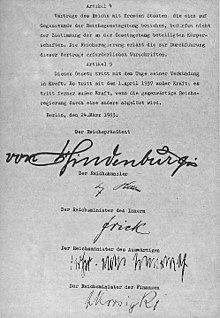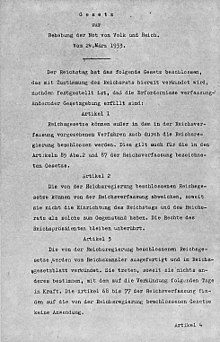Enabling Act of 1933
The Enabling Act of 24 March 1933, officially the Act for the Redress of the Distress of the People and the Reich, was an enabling act passed by the German Reichstag that de facto transferred complete legislative power to Adolf Hitler. It was the basis for the abolition of the separation of powers and enabled all subsequent measures to consolidate the National Socialist dictatorship.
The laws of the 1920s, especially Stresemann's and Marx's Enabling Acts, had created dangerous models for constitutional breach. The Weimar Constitution did not explicitly prohibit so-called constitution-breaking enabling laws. In practice, they were considered acceptable if passed by the same qualified majority that could be used to amend the constitution. This was a two-thirds majority in the Reichstag and Reichsrat.
When Hitler sought to consolidate his dictatorship at the beginning of 1933, he purposefully sought an Enabling Act. However, his law to remedy the distress of the people and the Reich of 24 March 1933 differed in decisive points from the Enabling Act of the Marx Cabinet of 1923:
- Hitler's government, according to his Enabling Act, was to be able to pass not only decrees but also laws and conclude treaties with foreign countries.
- Laws passed in this way could deviate from the Constitution.
- The scheme was not limited in content and was to be valid for four years.
- Neither a Reichstag committee nor the Reich Council could exercise control, for example, at least demand a repeal after the fact.
Another difference was the parliamentary situation: In contrast to the minority cabinet of Marx, the NSDAP, together with the DNVP, had an absolute majority in the Reichstag since the elections of 5 March 1933. Hitler's intention was to eliminate the Reichstag and de facto suspend the constitution.
Because it was foreseeable that the SPD deputies would not agree to the law and the KPD deputies could not appear because of flight or arrest, the two-thirds majority necessary for a law amending the constitution was endangered. Therefore, first the deputies of all parties except the SPD, under the eyes of illegally present armed and uniformed SA and SS members, changed the rules of procedure of the Reichstag, according to which unexcused absent deputies were formally considered "present" before proceeding to vote on the Enabling Act in the Reichstag. In order to achieve the two-thirds majority to pass the law, the votes of the Centre Party were decisive because of the opposing votes of the SPD.

Text of the law (sheet 2)

Text of the law (sheet 1)
Previous story
Hitler had been appointed chancellor of a coalition government by Reich President Paul von Hindenburg when he seized power on January 30, 1933, in which the National Socialists were clearly in the minority: Apart from Hitler, only Interior Minister Wilhelm Frick and Hermann Göring, as ministers without portfolio, belonged to the NSDAP. In terms of numbers, the conservative, mostly aristocratic specialist ministers who had already formed the Papen and Schleicher governments dominated, as did Alfred Hugenberg, the chairman of the DNVP, and Franz Seldte of the veterans' organization Stahlhelm, Bund der Frontsoldaten. They were to "frame" Hitler and thereby make him harmless. Vice-Chancellor Franz von Papen rejoiced, "We've got him committed," and Hitler scolded that now "the gang" would not get rid of him until the aged Hindenburg died. To free himself from the conservative grip, he had the Reichstag re-elected on March 5, 1933, but fell short of an absolute majority. Thus he remained dependent on his conservative coalition partner. The National Socialists had abolished the binding to the fundamental rights of the Weimar Constitution with the decree of the Reich President for the protection of the people and the state on 28 February 1933.
Now it was a matter of getting all the power in their hands, even as far as legislation was concerned. They planned an Enabling Act, which, however, required the approval of two-thirds of the Reichstag. Already on March 15, Interior Minister Frick had announced in the Cabinet that the law would be "so broadly formulated that it would be possible to deviate from any provision of the Reich Constitution." Of Hitler's conservative ministers, only Hugenberg expressed reservations and suggested that the laws thus passed should not come into force until the Reich President had given his approval. This, however, was rejected by Hindenburg's Secretary of State Otto Meissner as "not necessary." To pass the bill, a double two-thirds majority was required: two-thirds of the deputies present had to agree, and two-thirds of the legal members of the Reichstag had to be present when the vote was taken. Thus, of the 647 deputies, 432 had to be present. The SPD and KPD had 201 deputies. To prevent the validity of the vote, therefore, in addition to these 201 deputies, only 15 other deputies would have had to stay away from the vote (647-216 = 431). In order to prevent this, the Imperial Government moved an amendment to the Rules of Procedure. According to this, those deputies who stayed away from a Reichstag session without excuse were also to be considered present. These "unexcused" absentees also included deputies who had previously been taken into "protective custody" or expelled.
In order to convince the bourgeois deputies, the National Socialists staged the Day of Potsdam for the opening of the newly elected parliament on March 21, 1933: the Reichstag convened in the Potsdam Garrison Church, black-white-red flags flew, Hitler, all bourgeois in tails, bowed to Hindenburg, who wore his uniform: This was intended to give the impression that the new government did not represent something revolutionarily new, but was continuing the tradition of the Kaiserreich.
Content
Original extract of the Enabling Act, which came into force on 24 March:
The Reichstag has passed the following law, which is hereby promulgated with the consent of the Reich Council, after it has been established that the requirements of constitution-amending legislation have been met:
Article 1 Imperial laws may also be passed by the Imperial Government in addition to the procedure provided for in the Imperial Constitution. This shall also apply to the laws referred to in Articles 85 (2) and 87 of the Reich Constitution.
Article 2 The Imperial laws passed by the Imperial Government may deviate from the Imperial Constitution insofar as they do not deal with the establishment of the Reichstag and the Reich Council as such. The rights of the Reich President shall remain unaffected.
Article 3 The Imperial Laws passed by the Imperial Government shall be executed by the Imperial Chancellor and promulgated in the Imperial Law Gazette. Unless they provide otherwise, they shall enter into force on the day following their promulgation. […]
Article 4 Treaties of the Reich with foreign states which relate to subjects of Reich legislation do not require the consent of the bodies involved in the legislation. The Imperial Government shall issue the regulations necessary for the implementation of these treaties.
Article 5 This law shall enter into force on the day of its promulgation. It shall cease to be in force on 1 April 1937; it shall also cease to be in force when the present Reich Government is replaced by another.
This meant that new laws no longer had to be in conformity with the constitution, in particular that the preservation of fundamental rights no longer had to be ensured, and that laws could also be enacted solely by the imperial government in addition to the constitutional procedure. Thus the executive was also given legislative power. The constitutional articles 85 (2) and 87 mentioned in the first article bound budget and borrowing to the legislative form. Through the Enabling Act, therefore, the budget and borrowing could now be decided without the Reichstag.
The validity of the Enabling Act was four years - thus Hitler's demand "Give me four years and you will not recognize Germany" was realized.
Questions and Answers
Q: What was the name of the Enabling Act in German?
A: The Enabling Act was called Ermächtigungsgesetz in German.
Q: When was the Enabling Act passed by Germany's parliament?
A: The Enabling Act was passed by Germany's parliament (the Reichstag) on 23 March 1933.
Q: What did the Enabling Act enable Chancellor Adolf Hitler and his cabinet to do?
A: The Enabling Act enabled Chancellor Adolf Hitler and his cabinet to enact laws without the participation of the Reichstag.
Q: How did the Nazis obtain dictatorial powers using largely legal means?
A: The Nazis obtained dictatorial powers using largely legal means through two major steps, firstly with the Reichstag Fire Decree, and secondly with the passing of the Enabling Act.
Q: What is another name for the Enabling Act?
A: Another name for the Enabling Act is Gesetz zur Behebung der Not von Volk und Reich ("Law to Remedy the Distress of People and Empire").
Q: Who enacted laws without participation from Reichstag due to passage of this act?
A: Due to passage of this act, Chancellor Adolf Hitler and his cabinet were able to enact laws without participation from Reichstag.
Search within the encyclopedia